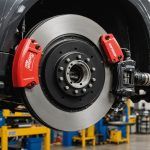In the bustling landscape of fleet management within the UK, businesses consistently encounter challenges such as soaring fuel costs and the need for enhanced efficiency. Whether it’s a delivery business navigating city streets or a logistics giant traversing the motorways, fuel consumption is a pivotal element in operational efficiency. Technology emerges as a critical ally, offering innovative solutions to monitor and manage fuel consumption. Today, let’s explore how telematics and advanced software solutions empower fleet managers and drivers to reduce fuel costs and optimize driving practices.
Leveraging Telematics for Real-Time Monitoring
Telematics systems have transformed the landscape of fleet management. These advanced technologies equip vehicles with the capability to communicate data back to a central system. For UK fleets, this ushers in a new era of real-time monitoring and management.
Topic to read : How can planning for future vehicle technology advancements influence current purchasing decisions in the UK?
The Power of Data
With telematics, every piece of vehicle data, from speed to fuel consumption, is meticulously tracked. This data empowers fleet managers to make informed decisions that directly impact fuel efficiency. By examining patterns, identifying drivers with excessive idling or aggressive driving habits becomes possible.
Real-Time Insights
Real-time feedback is invaluable. Telematics systems can alert drivers immediately, allowing them to adjust their driving habits. If a driver is excessively idling, an alert can prompt them to turn off the engine, reducing unnecessary consumption.
Also to read : What role do consumer reviews play in purchasing decisions for UK vehicles?
Enhancing Efficiency
For fleets, efficiency equates to savings. With the ability to monitor and adjust driving behavior instantaneously, fleets can significantly reduce their fuel costs. The result is a more economically efficient fleet that can operate on tighter margins, benefiting the overall bottom line.
Harnessing Fleet Management Software
Fleet management software plays an instrumental role in optimizing fuel consumption. By analyzing comprehensive data points and offering drivers actionable insights, these software solutions are revolutionizing how UK fleets operate.
Centralized Data Analysis
Fleet management software aggregates vast amounts of data from all vehicles within a fleet. This centralized repository allows for detailed analysis to identify trends or anomalies in fuel consumption. By utilizing these insights, fleet managers can pinpoint inefficiencies and implement strategies to mitigate them.
Optimizing Routes for Fuel Efficiency
One of the key advantages of this software is route optimization. By calculating the most efficient routes based on real-time traffic conditions, fleets can decrease travel time, minimizing fuel consumption. Better-planned routes not only save fuel but also enhance driver productivity.
Training and Development
The insights gained from fleet management software can also be used to train drivers. By understanding their fuel consumption habits, drivers can be coached on how to optimize their driving practices, leading to long-term efficiency improvements and reduced fuel costs.
The Role of Driver Behavior in Fuel Efficiency
Drivers are at the forefront of managing fuel consumption. Their behavior behind the wheel can significantly influence a fleet’s overall efficiency. By understanding and adjusting driving habits, drivers can contribute to substantial cost savings.
Understanding the Impact of Driving Habits
Aggressive driving, such as rapid acceleration or heavy braking, can lead to increased fuel consumption. By promoting smoother driving styles, fleets can maintain optimal fuel efficiency. Drivers should be encouraged to maintain steady speeds and avoid unnecessary idling.
Implementing Incentive Programs
Incentive programs can motivate drivers to adopt fuel-efficient practices. By rewarding drivers for reducing fuel consumption, fleets can foster a culture of efficiency. These programs not only improve fuel efficiency but also enhance driver satisfaction and retention.
Continuous Monitoring and Feedback
Regular monitoring and feedback loops are crucial in maintaining efficient driving practices. Drivers benefit from receiving constructive feedback based on telematics and software data. This continuous improvement cycle strengthens the driver’s role in fuel management, ensuring sustained efficiency gains.
Future Technologies and Trends in Fuel Efficiency
As technology advances, new tools and innovations continue to emerge, promising even greater efficiency for UK fleets.
Electric and Hybrid Vehicles
The rise of electric and hybrid vehicles presents a viable option for fleets looking to decrease fuel consumption. These vehicles offer a sustainable alternative, significantly lowering fuel usage and associated costs.
Advanced Analytics and Machine Learning
Machine learning algorithms are increasingly applied to analyze fleet data. These advanced analytical tools can predict trends, helping fleets prepare and adapt to changing conditions. By leveraging predictive analytics, fleets can anticipate fuel needs and optimize driving patterns for heightened efficiency.
Integration of IoT Devices
The integration of IoT devices offers another layer of connectivity. Sensors can continuously monitor vehicle performance and fuel consumption, providing fleet managers with real-time insights. These devices enhance the fleet’s ability to make proactive adjustments, ensuring optimal performance.
Conclusion
Embracing technology is imperative for UK fleets aiming to improve fuel efficiency and reduce costs. Through telematics, fleet management software, and insight-driven driver programs, businesses can achieve substantial economic and environmental benefits. As technology continues to evolve, fleets that adapt will lead the way towards a more efficient and sustainable future.











